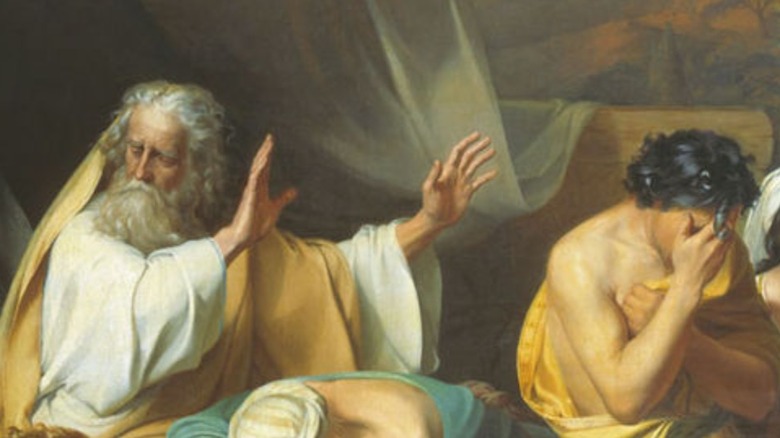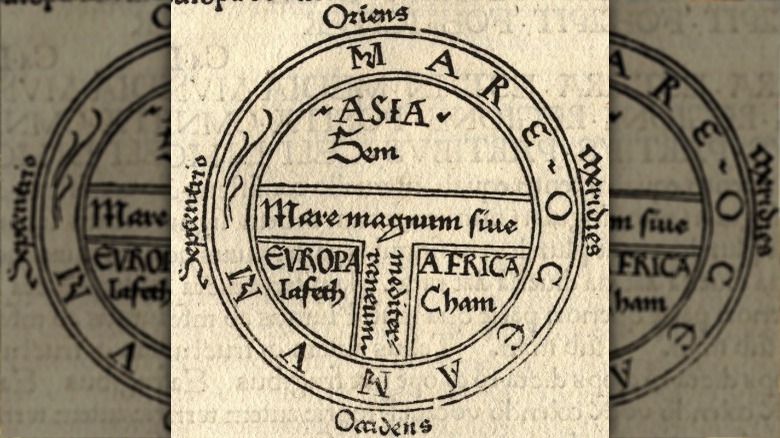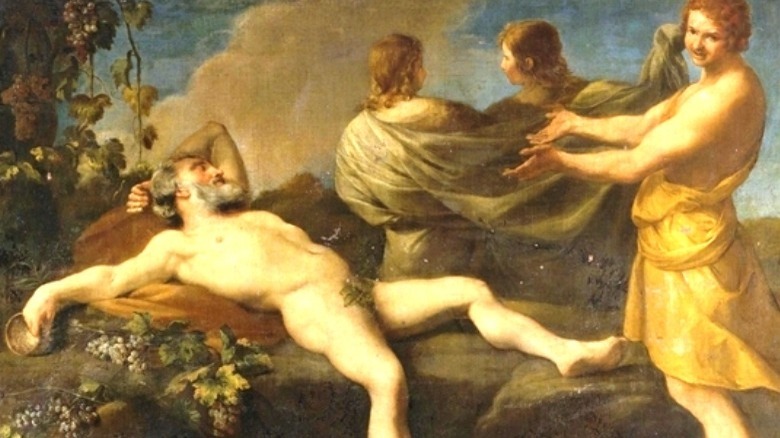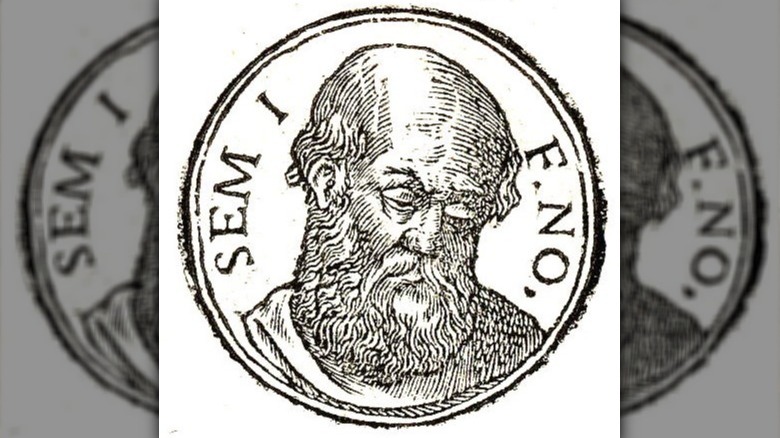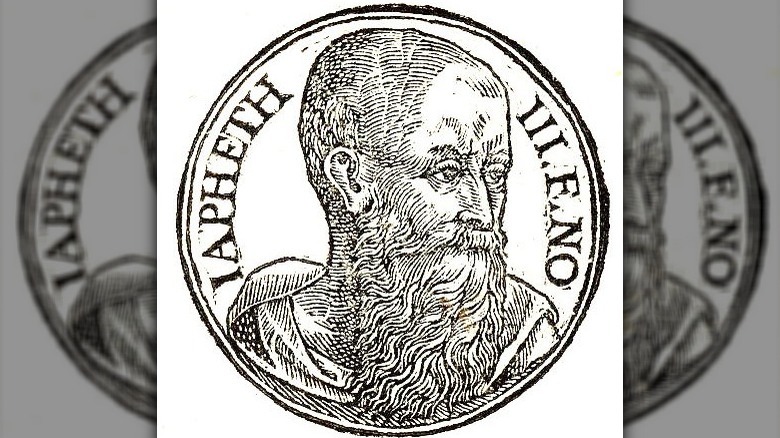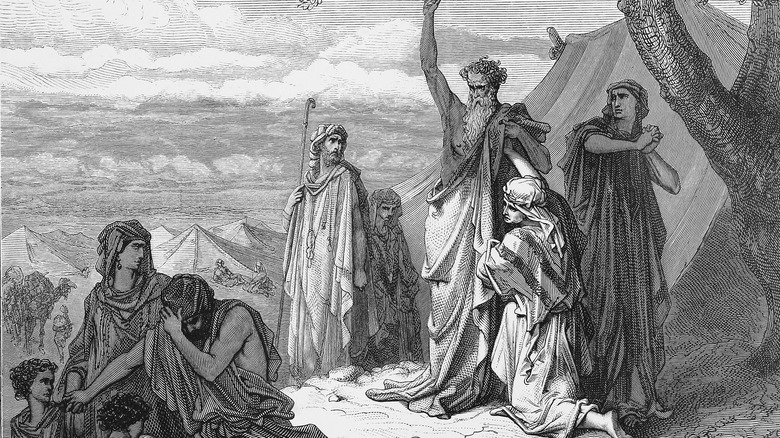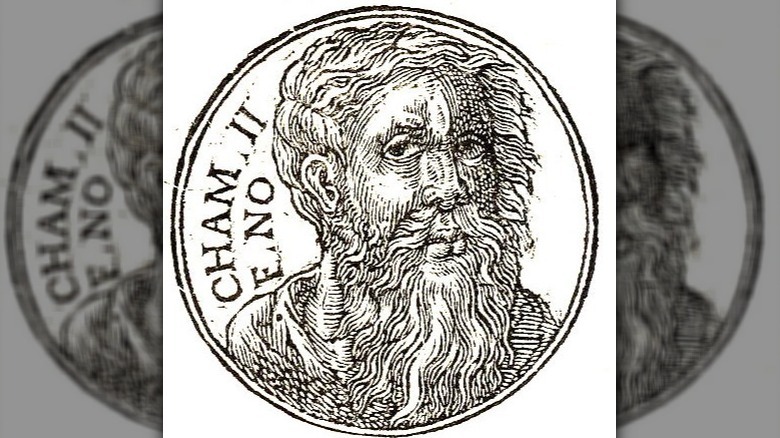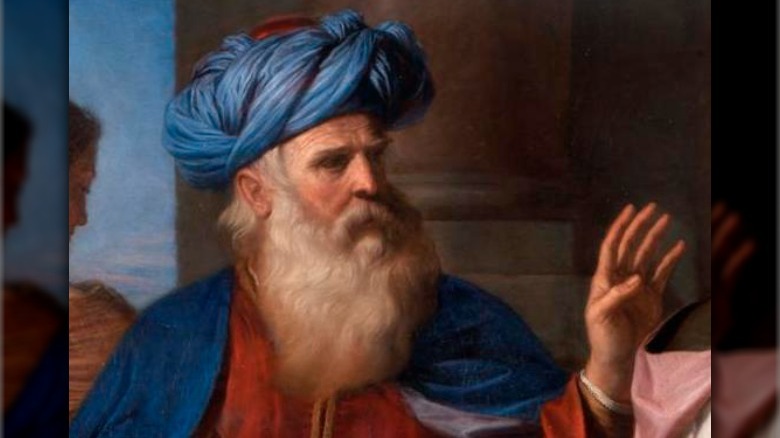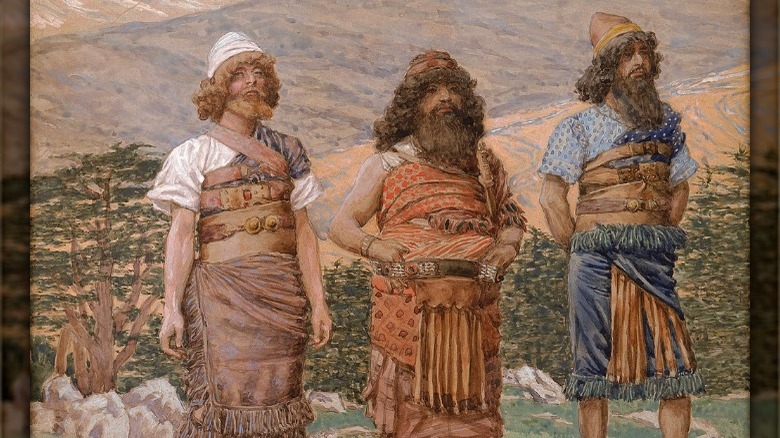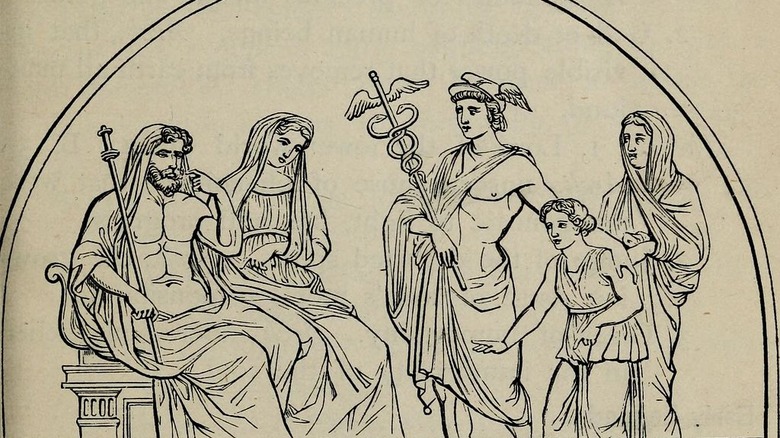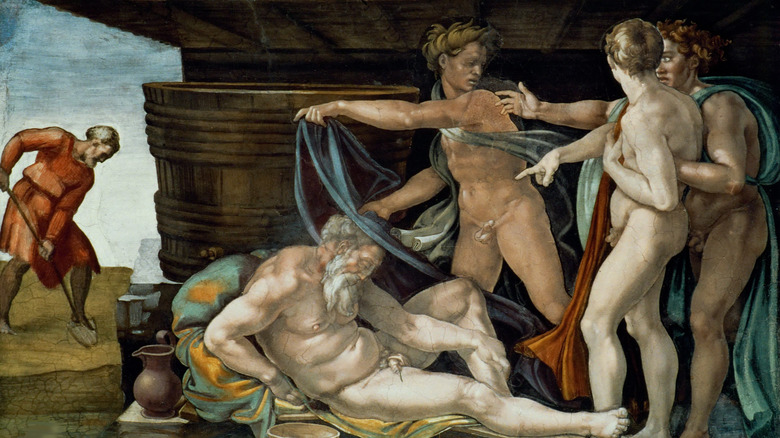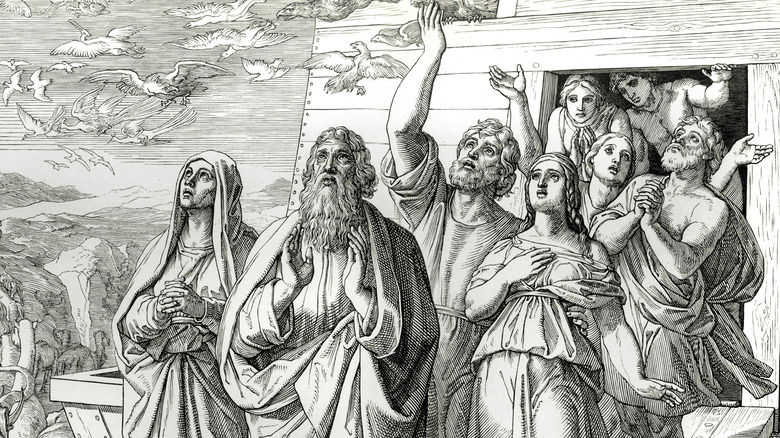The Untold Truth Of Noah's Sons
Even if you're not all that religious, there's probably a pretty good chance that you've heard the story of Noah's Ark. You know, the story of the Great Flood, sent by God to wipe out humanity — the one where two of each animal got shepherded onto a huge boat built by Noah so that they could ride out the waves. That one.
But there weren't only animals on that ark. There were people, too, and eight of them, to be exact: Noah (obviously), his three sons (Shem, Ham, and Japheth), and all four of their wives. Now, with the exception of Noah, in the context of the Flood myth, there really isn't all that much left to say about all of these Biblical figures. Shem, Ham, and Japheth might have helped their father build the ark, per ICR — a single person building a gigantic wooden ship all on their own is just a little far-fetched — but beyond that, they aren't all that vital to the narrative of the Flood. That said, if you step just outside that particular story about the Great Flood, then there's actually a little more for you to sink your teeth into. Noah's sons have some claims to fame outside of just their father's glory.
Noah's sons fathered all of humanity
According to Mt. Holyoke, the whole reasoning behind the Great Flood goes something like this: back in the time of Noah, humanity wasn't exactly looking its best. God wasn't too happy about all of these wicked humans, so he sent the Flood as a way to pretty literally cleanse the Earth. Only Noah and his family were spared from the utter annihilation of the human race.
But that also meant that the job of repopulating the entire globe fell onto the shoulders of this one family — more specifically, onto the shoulders of Noah's three sons. And, well, they ended up carrying out that job. The Earth was, more or less, divided up into three regions, which become forever tied to the three brothers. Though the exact details sometimes vary, Shem was associated with Israel, Japheth with Europe (and part of Asia), and Ham with Africa (and the rest of Asia). Their descendants ultimately went on to populate each of those regions.
There's even more detail than that, though. As in, there are entire family trees tracking this lineage. Answers in Genesis explains that many names in this family tree can be tied to specific regions — Turkey might come from Tarki, Assyria might come from Asshur, and so on. Reading the family trees this way can basically tell you just how, through the Biblical lens, the Spanish are related to the Gauls or the Goths (they're basically cousins, all descended from Japheth).
A vineyard changed the fates of Noah's sons
If you were to look into Noah's sons, then the story you'd come upon the most would likely be the one involving Noah, some wine, and a little bit of nudity.
Basically, sometime after the events of the Great Flood, Noah and his family ended up settling down and owning a vineyard. Of course, given that this is a vineyard, wine was pretty readily available and, long story short, Noah got drunk. So drunk, in fact, that he ended up passing out in a tent, stark naked (via Thetorah.com). While Noah was unconscious, one of his sons, Ham, ended up walking in and seeing his father completely nude. That sort of situation doesn't exactly sound comfortable, and so Ham didn't really do much about it, aside from finding his two brothers and telling them what he'd seen.
Shem and Japheth didn't react in nearly the same way, being "sensitive and modest" (via Encyclopedia.com) while Ham was decidedly not. The two of them decided to rectify the situation by walking into the tent backwards — so as to not see their naked father — with some sort of garment slung over their shoulders, which they dropped to cover up Noah as he slept. Everything was dealt with, right? Well, not really. Noah eventually woke up from his nap knowing exactly what had happened, and each of his sons would get their comeuppance, whether good or bad.
Shem was blessed by God
If you're having a rough time knowing who's who between the three brothers, then here's the description of Shem in a nutshell: the golden boy of the group. Shem was basically the biggest deal, giving him a lasting reputation of being the wisest and most capable among his brothers (via Encyclopedia.com). So, seemingly fittingly, after helping to cover his naked father with a cloth, Shem was singled out to receive the highest blessing: "Blessed be the LORD, the God of Shem" (via First Fruits of Zion) — just Shem, not Japheth or Ham. Shem and his descendants (the people of Israel) would be uniquely blessed by God and were gifted "the commandment of techelet" — a special blue thread which came to symbolize priesthood.
On top of that, Japheth's descendants were allowed to "dwell in the tents of Shem." The wording of that phrase seems to imply Shem's superiority here (after all, the inverse — Shem's descendants being allowed into the lands of Japheth's descendants — didn't need to be mentioned). It also means that Israel in particular could, and should, be strengthened through other people joining with them (even if, again, the inverse wasn't necessarily true).
All of that perceived religious superiority got used as justification for quite a few conquests, like those in Samaria, Idumea, and Palestine. After all, if the Bible validates it, then it's obviously not wrong or aggressive, right?
Japheth was also blessed (but a little less)
Shem wasn't the only one of the brothers to go and cover up his naked father; Japheth was there, too, but he didn't receive the same blessing as his brother. And that's led to a bit of debate and confusion over just how Japheth's blessing really worked.
In a single breath, Shem was blessed with the glory of God, while Japheth was told this: "May God enlarge Japheth, and let him dwell in the tents of Shem" (via First Fruits of Zion). Or, more specifically: "May God enlarge Japheth's territory and numbers!" (via TheTorah.com). Basically, his blessing was exactly the way it sounds — Japheth was given a lot of land for his descendants to expand around the world. Oh, and those descendants were also given the privilege of being buried in Israel (though they were still markedly different from Shem's descendants who lived in Israel). Taking the whole story as a metaphor, Japheth's people can be seen as the countries who decide to ally themselves with Israel and the Jewish people.
But none of that really explains why Japheth's blessing was different at all. Even though he received a reward, why wasn't he also blessed by God? Unfortunately, there isn't really a good answer to that question. It just seems like Shem somehow put more effort into covering up Noah (how that works exactly is anyone's guess). In light of that, the two brothers were rewarded accordingly for their effort.
Ham was punished (but not really)
Here's the part of the story that gets kind of strange. In the story of the drunkenness incident at the vineyard, Ham was the one who saw his father naked, right? His two brothers were rewarded for their modesty and deference, and so it would make sense that, per the intended morals of the tale, Ham would be punished (in this case, with a life of servitude to his brothers).
But that's not really what happened. Instead, if you read the text, you find this: "[Noah] said, 'Cursed be Canaan; the lowest of slaves shall he be to his brothers'" (via TheTorah.com). If you're wondering who in the world Canaan is, then you have every right to be confused. Canaan is actually one of Ham's sons (thus, one of Noah's grandsons) and was, as far as anyone can tell, completely innocent of any crime.
So then, why was Canaan punished instead of Ham? Well, the reasons are still a pretty big mystery to everyone, but there are a few theories. TheTorah.com mentions some potential reasons within the narrative, many of which boil down to the idea that Noah thought that cursing Canaan (and, by extension, all of Ham's descendants) would be more devastating than cursing Ham himself. Or, if you want to consider more historical possibilities, the original story could've been literally lost in translation, and the version that exists today just might not be entirely accurate.
Ham is sometimes thought to be dark-skinned
These stories about Noah's sons have been around for a decently long time, and so they've seen their fair share of readings and analyses over the years. One of those particularly prominent (and potentially problematic) readings has to do with Ham. More specifically, it's Ham's name that invites some uncomfortable questions, given that, according to The New York Times, it's been translated to mean "dark," "black," or "heat." From that translation came the assumption that Ham was dark-skinned.
On its own, that conclusion really isn't all that bad, but, per BYU Studies, the story of the Curse of Canaan had already been used throughout history to vilify various groups and promote racism. With the rise of the slave trade, this translation of Ham's name led to the use of this story as a justification for slavery. Ham was dark-skinned and committed sinful acts, so he and his descendants were to be punished with lives of servitude, as described by the curse laid on Canaan.
It's not exactly a great legacy, but it's also worth pointing out that the original story was never intended to be read as a religious justification for slavery. In fact, this popular translation of Ham's name was most likely a mistake — it's just that it was a mistake that happened to catch on. And the original text itself never makes any mention of skin color at any point, much less links it to any sort of racial hierarchy.
Shem had some pretty famous descendants
The Bible has got some really extensive family trees. For real, all the genealogy here is no joke, and if you felt like doing a bit of reading, you'd be able to figure out just who was related to who and how. There's a serious amount of detail here and, don't worry, Noah's sons aren't left out of the fun.
All three brothers had a fairly ludicrous number of descendants — Genesis 10 lists Japheth as having the least with 14 — but it's Shem's bloodline that proved to be especially influential. Genesis 11 gets into even further detail on Shem's family tree, laying out all the steps to get to Abram, more commonly known as Abraham, the first patriarch of the Hebrew people (via Britannica), though Judaism, Christianity, and Islam all view him in the same sort of patriarchal role (via Bible Odyssey).
But things don't end there, because Abraham's descendants (and thus, by definition, Shem's descendants) also include some of the most recognizable figures in religion: Jesus Christ in Christianity, and the Prophet Muhammad in Islam. That sort of speaks for itself, doesn't it?
There are questions about Noah's sons
Most of the time, when you're talking about Noah's three sons, it's assumed that Shem is the oldest, Ham is the middle child, and Japheth is the youngest (via Jewish Encyclopedia). Pretty simple, right? Oh, if only.
There's actually a lot of debate out there about how Noah's family worked, and birth order is just the beginning. For one, the text of the Old Testament isn't even self-consistent. Britannica explains that the Old Testament actually has two separate sources, one of which calls Japheth the second son, while the other implies he's the youngest. Just to make things even more confusing, other points in the Bible will say that Japheth is two years older than Shem. And, while we're talking about Shem, he's usually considered to be the oldest, but that's just an assumption. Shem is often listed first; maybe that's because he's the oldest, or maybe that's because he was the most favored by God. In the latter case, he could even be the youngest — some rabbis actually believe just that, according to Encyclopedia.com (youth equating to wisdom and righteousness is a religious motif).
Oh, and don't worry, Ham hasn't been spared from the confusion. TheTorah.com argues that Ham might not have even been one of Noah's sons. Rather, Canaan might've been the youngest of the brothers instead — he's even directly referenced as such, making it seem like Shem, Japheth, and Canaan (in that order) were the sons of Noah.
Connections between Noah's sons and Greek mythology
Mythologies in the ancient world have this really funny habit of overlapping with each other. Just look at Greek and Roman mythology for the most obvious examples — with few exceptions, the stories are basically the same. Gods in some mythologies are effectively the same as gods in other mythologies, and that's just how it is. The Bible usually isn't involved in these crossovers. Except for in this case.
The story of Noah's sons dividing up the Earth is remarkably similar to a particular Greek myth: the one where Ouranos (the Greek personification of the heavens) divided up the world between his sons Cronos, Titan, and Iapetus (via "Dictionary of Deities and Demons in the Bible"). On top of that, this act of splitting the world into three is presented, in both cases, as a changing of the guard, power being passed on to this new, great generation.
"Uncovering Jewish Creativity in Book III of the Sibylline Oracles: Gender, Intertextuality, and Politics" delves even further into this and works with the reading of this particular Sibylline narrative as, essentially, Biblical stories with a layer of Greek paint. Japheth in particular gets mentioned, since he's pretty regularly conflated with the Titan Iapetus, a pattern that's been noted since the Renaissance; he was even directly referred to as "Iapetus" in another source. The comparisons continue further down his family line, too, with Japheth's son Enoch getting compared to Iapetus' famous son Atlas.
Maybe the sons of Noah were real?
With any good mythical or legendary story, the question of "What if this thing was real?" always hangs around in the air. Noah's sons have also undergone really similar treatment, and there's some research out there that might suggest that, yes, they were real people.
A 2017 study published by Nature Communications dives deep into the genomes of Egyptian mummies, ultimately reaching the conclusion that ancient Egyptians shared more genetic material with people from Near Eastern regions (unlike modern-day Egyptians, who tend to have more Sub-Saharan African ancestry). Now, what does that mean in terms of Noah's sons? Well, Patterns of Evidence took those findings and tied them to Biblical explanations, proposing that the movement of Ham's descendants from Mesopotamia (in the Near East) to Egypt could explain those genetic links. A report by the Philosophical Society of Great Britain also leans toward the same beliefs, using archaeological finds to link their descendants to the migration and relations of ancient civilizations.
But maybe some of this should be taken with a grain of salt. The National Center for Science Education explains just why the story of Noah's Ark is pretty impossible, but also adds that there's no way all of humanity can be descended from only Noah's sons. There's just not enough genetic diversity there to warrant the diversity that can be seen now. Even if you accounted for tons of genetic mutations in every generation, it sort of defies logic.
Noah might have had even more sons
In general, if you were to do a quick search on the sons of Noah, you'd probably see that his kids were Shem, Ham, and Japheth. And that's usually the accepted version of the story, at least in the Old Testament. But if you expand your horizons just a little, then you'd find that this family tree might be slightly larger.
For one, this same story is told in the Quran (via Answering Islam) seems to make reference to a fourth son, one who decided to "betake [him]self to some mountain" only to be "among those overwhelmed in the Flood." He's not really mentioned all that much beyond that, though; for that matter, Noah was even told that this son wasn't to be considered part of the family anymore. This disowned son doesn't even have a name, though, according to TheTorah.com, some refer to him as either "Yam" or "Kan'an" (the latter of which looks a lot like "Canaan," further fueling theories that Canaan himself was also a fourth son of Noah).
But the Quran isn't the only source that seems to reference additional sons of Noah. Rather, Irish mythology names Cesair — an important queen in Irish lore (via Oxford Reference) — as the daughter of Bith, a son of Noah who wasn't allowed on the ark (via Your Irish Culture). While Bith doesn't exist in the Old Testament, he seems to tie together Biblical and mythological stories.
